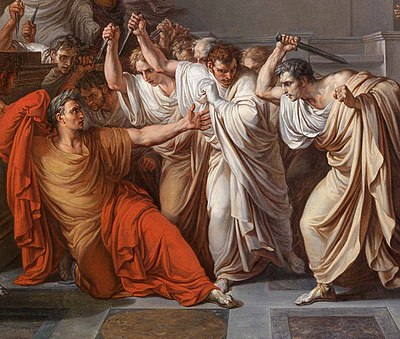Note: If you wish to receive, via e-mail, (1) my weekly newsletter or (2) daily copies of these posts, notify me at [email protected] and indicate which you would like. I promise not to share your e-mail address with anyone. To unsubscribe, send me a follow-up email.
Wednesday
While there’s much we don’t know about Yevgeny Prigozhin’s coup attempt (or accidental coup or mutiny or armed insurrection or bargaining strategy—there’s no consensus on exactly what the head of the Wagner mercenaries was up to this past weekend), references to Julius Caesar crossing the Rubicon have been frequent. This gives us an excuse to apply Shakespeare’s play to the events.
Not that Prigozhin has anything in common with Brutus, the “noblest Roman of them all.” That’s because the man is just another corrupt and brutal Russian thug, made rich by Putin before parting ways with his patron. He is more like self-interested Cassius, described by Caesar as having “a lean and hungry look.” (Prigozhin has more of a pudgy and hungry look but you get the point.) Maybe the experience of seeing his troops wiped out galvanized him into action, prompting him into an uncharacteristic bout of truth-telling. Or maybe he was just upset at seeing Putin preparing to take his men and incorporate them into the Russian military.
That being said, if Putin ultimately annihilates him, he may be sorry that he didn’t follow the advice of Shakespeare’s conspirators. While, in his public pronouncements, Prigozhin went out of his way not to name Putin, Cassius is not so delicate. As the Roman senator points out, Caesar may seem to “stride the world like a colossus,” making others seem like “petty men”—but if he is seen as a man like other men, then what is to keep a Cassius or a Brutus from taking his place? Prigozhin, by contrast, never attempted to demythologize Putin.
Cassius also tells Brutus that, if they remain underlings, the fault “is not in our stars but in ourselves.” In other words, we chart our own destinies.
Brutus, meanwhile, talks about making the most of an opportune moment:
There is a tide in the affairs of men,
Which, taken at the flood, leads on to fortune;
Omitted, all the voyage of their life
Is bound in shallows and in miseries.
On such a full sea are we now afloat;
And we must take the current when it serves,
Or lose our ventures.
If Prigozhin really could have attacked Moscow after having captured Rostov-on-Don, headquarters of Russia’s Southern Military District, then he would have taken advantage of the high tide. By instead accepting Putin’s deal and retreating to Belarus, he may discover the rest of his life to be bound in shallows and in miseries. More than one commentator has observed that he is now a “dead man walking.”
It’s worth noting that Brutus, to his sorrow, doesn’t fully take his own advice, allowing Marc Antony to go free rather than disposing of him when he has a chance. In a sense, after having crossed their own Rubicon by assassinating Caesar, he and Cassius then retreat back across the river. As a result, they suffer the fate that Putin may be planning for Prigozhin.
Perhaps I do the Wagner leader an injustice—maybe the tide was never as full as it appeared and, rather than losing an advantage, he never had one. But to have had any chance at all, it appeared that he needed to go all in. That he failed to do.
Washington Post’s David Ignatius, in assessing Putin’s survival skills, has invoked a well-known truism: Prigozhin made the mistake of shooting at the king and missing. Ignatius goes on to invoke two other two other Shakespeare figures:
Putin’s vulnerabilities were vividly on display last weekend, but so were his uncanny survival skills. He got inside Prigozhin’s conspiratorial plot and stopped it. The Russian leader is a mysterious figure, far more so than the cartoon versions sketched by his enemies. He is Shakespeare’s Macbeth, a villain whose hands drip with the blood of his victims. But he’s also Hamlet, the vain, self-absorbed prince who delayed taking action against his enemies until it was nearly too late.
I wouldn’t call Hamlet vain and self-absorbed, but perhaps Putin is a Hamlet-like waffler. Although that being said, unlike the Danish prince he would never hesitate killing a man just because he seemed to be praying. In fact, he is more like Claudius, with his elaborate plots involving poisonous potions and poison-tipped swords (or a ricin-tipped umbrella in Putin’s case ). But Claudius’s plotting eventually backfires on him, and it appears that Putin’s encouragement of a mercenary force to do his dirty work has done the same.
Further thought: In another Washington Post column, Harvard government professor Graham Allison gives Ukrainian President Zelensky advice that sounds very much like Brutus’s. In this moment of Russian dissension, Ukraine too has a high tide to its advantage and “must take the current when it serves, or lose [its] ventures.” Or as Allison puts it,
The extraordinary coup attempt by a Russian mercenary leader provides Ukraine with an unexpected opportunity to press whatever advantages it has in its war with Moscow. If it does not seize this chance and break the stasis that governs the battlefield in eastern Ukraine, we will enter a very different chapter in this conflict.
This “different chapter,” as Allison sees it, will be a perpetual stalemate rather than Ukraine gaining back its conquered lands. Now or never, in other words.
